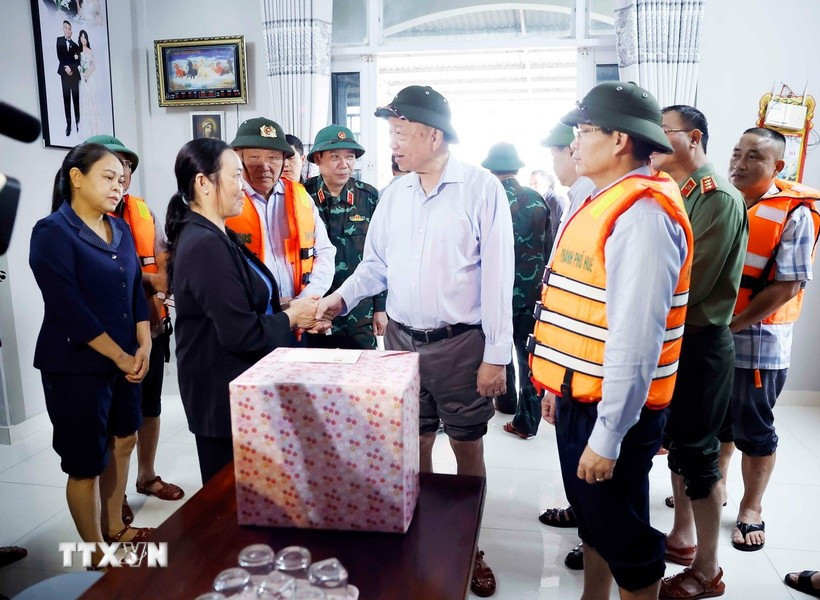Vietnam: Stronger rules in ‘people-centred’ disaster response

Hanoi (VNA) – Prime Minister Pham Minh Chinh, in his urgent dispatch issued on November 2, commended local Party committees, authorities and residents, along with military and public security forces, and residents for their coordinated actions against recent floods in the central region, guided by the “four-on-the-spot” principle and the spirit of solidarity and mutual support.
According to the dispatch, heavy rainfall and floods struck central localities in late October, causing significant loss of life and severe damage to homes and property.
Party General Secretary To Lam, the standing member of the Party Central Committee’s Secretariat, along with other Party and State leaders, closely monitored the situation, directed response efforts, and personally visited affected areas to offer support and encouragement.
The Government, the Prime Minister, Deputy Prime Ministers, and leaders of ministries, sectors and localities directly oversaw emergency operations, pooling all available resources to assist residents and mitigate the impact of floods and landslides. Their efforts helped mitigate losses and settle down lives in disaster-stricken areas.
The PM ordered secretaries of the Party Committees and chairpersons of the People’s Committees of Thua Thien-Hue, Da Nang, Quang Ngai, Quang Tri and Ha Tinh, as well as heads of relevant ministries, to continue with post-disaster recovery measures with the highest sense of urgency and effectiveness to restore normal life as quickly as possible.
Earlier, to accelerate the progress of the Party and State’s people-centred policies and improve disaster management efficiency, the National Civil Defence Steering Committee was established under the PM’s Decision dated July 23 on the back of merging the former Central Steering Committee for Disaster Prevention and Control and the former National Committee for Disaster Response and Search and Rescue. Its guiding principle is “Proactive, decisive, preventive, and ready to respond at the highest level to worst-case scenarios”.
As an inter-agency coordination body, the National Civil Defence Steering Committee is tasked with advising the Government and the PM on organising and managing civil defence nationwide. It directly oversees civil defence commands of ministries, agencies, and provinces.
Specifically, the committee advises the PM on building and enforcing policies, laws, strategies, projects and plans related to civil defence, disaster response, and search and rescue. It coordinates with ministries, government agencies, organisations and localities to ensure effective prevention, response and recovery efforts across the country.
PM Chinh serves as the committee’s head. Deputy PM Tran Hong Ha acts as the standing deputy head, alongside Minister of National Defence Gen. Phan Van Giang, Minister of Public Security Gen. Luong Tam Quang, Minister of Agriculture and Environment Tran Duc Thang, and Minister of Health Dao Hong Lan. Other members include leaders from ministries and state agencies such as the Vietnam News Agency.
Under the Government’s Decree No. 200/2025/ND-CP, effective on August 23, 2025, each province’s Civil Defence Command is led by the provincial People’s Committee chairperson, with a vice chairperson serving as the standing deputy head.
At the communal level, the Civil Defence Command is headed by the communal People’s Committee chairperson, supported by a vice chairperson as standing deputy heady.
The provincial Civil Defence Command is responsible for building and launching civil defence and disaster prevention plans, receiving and managing disaster-related information, advising chairperson of the provincial People’s Committee on declaring or lifting civil defence levels, and directing response and recovery operations.
Since 2021, under Regulation No. 01/QD-TWPCTT issued by the Central Steering Committee for Disaster Prevention and Control, provincial disaster response performance has been assessed using specific criteria through 2025. The goal is to establish measurable and objective indicators to evaluate each province’s annual disaster management performance.
This framework enables authorities to quantify results across prevention, response, and recovery phases, allowing for performance comparisons among localities. By using the disaster prevention index, central and local agencies can identify strengths and weaknesses in their disaster management strategies, enabling targeted improvements.
The index comprises four groups, 24 criteria and 52 sub-indicators, totaling 100 points, with 15 for organisation and planning, 45 for prevention, 20 for response, and 20 for recovery.
Localities scoring above 80% are rated as performing well; those between 50% and 80% are considered adequate but in need of improvement; and those below 50% fail to meet requirements and must ramp up their disaster response efforts.
To earn recognition from the PM and the National Civil Defence Steering Committee during the response to storms Bualoi and Matmo (No. 10 and 11 in 2025), local leaders, particularly chairpersons of provincial People’s Committees, must demonstrate decisiveness and effectiveness in assisting affected residents. Evaluations are based on specific, pre-approved criteria rather than general assessments.
Under the Politburo’s Directive No. 45-CT/TW dated April 14, 2025, all provincial Party secretaries appointed for the 14th National Party Congress must not be natives of their respective provinces.
Further, the Politburo’s Conclusion No. 201-KL/TW dated October 31, 2025 clearly stated the requirement that all chairpersons of the people’s committees, heads of inspection committees, and chief inspectors be non-locals, with full implementation due by December 15, 2025. The policy aims to prevent localism and factionalism and ensure officials act impartially and free from conflicts between personal ties and official duties.
In areas such as disaster response and recovery, leaders are expected to act as representatives of the Party and the people, serving all citizens rather than prioritising personal or local interests./.





